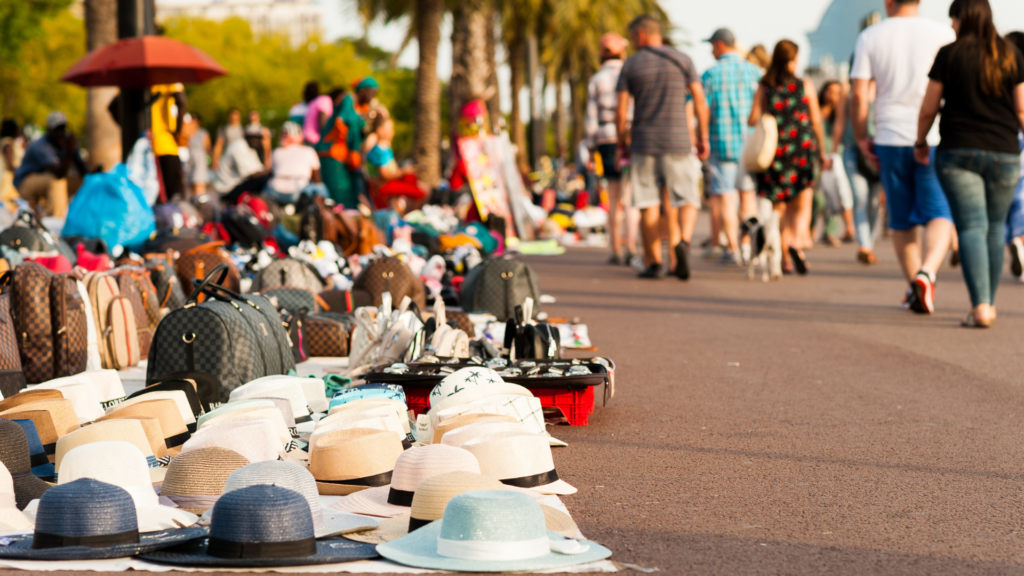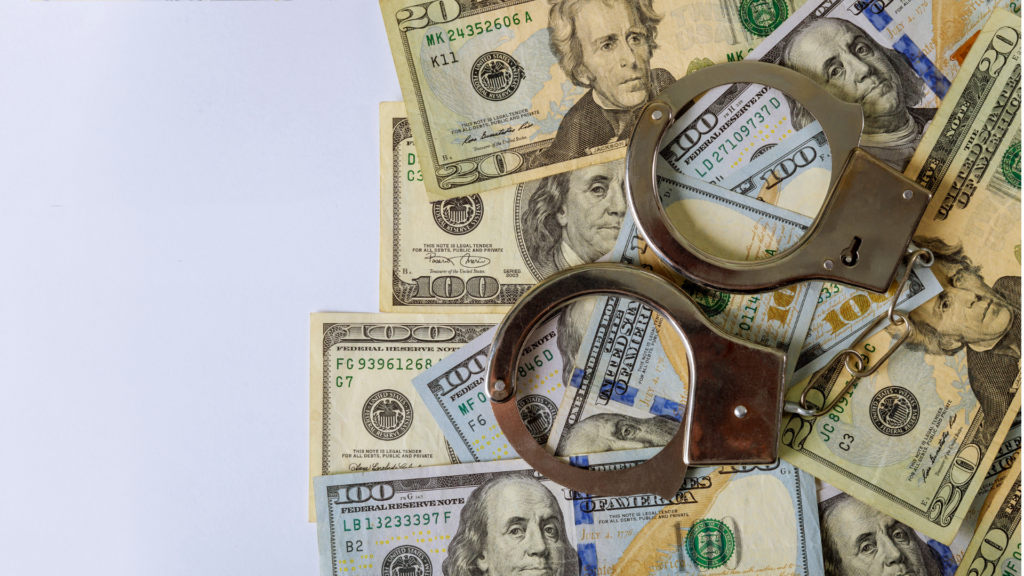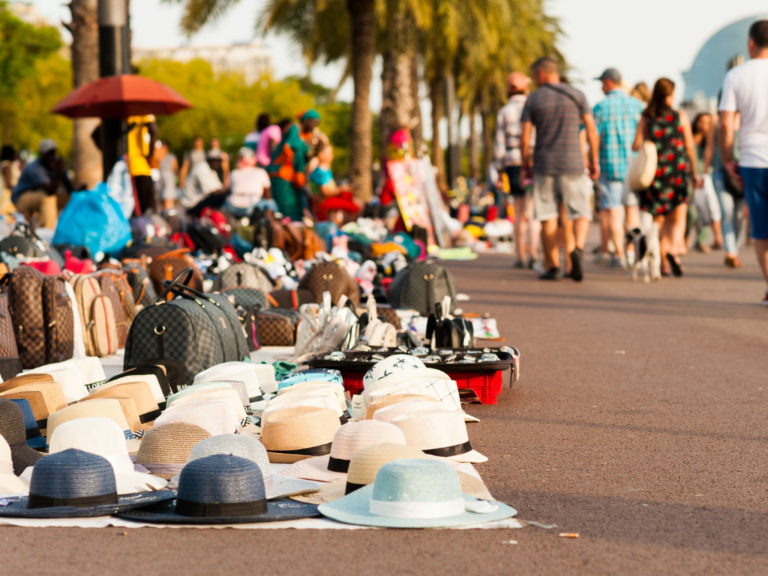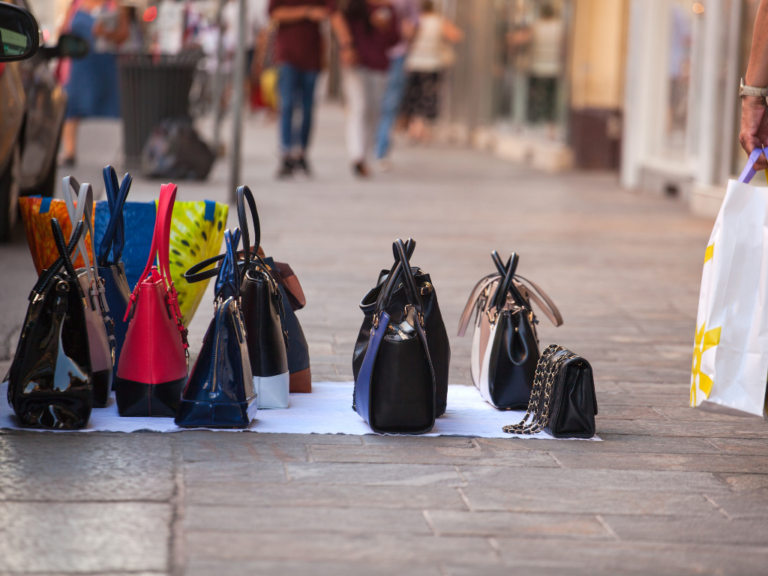Call us now:
The sale of counterfeit goods in Vietnam has been a long-standing issue in society, causing significant repercussions. It not only affects the credibility and profits of legitimate businesses but also poses risks to consumers’ health, especially when counterfeit products involve food, pharmaceuticals, or substandard cosmetics. So, how is the trade of counterfeit goods handled in Vietnam in 2023?

What qualifies as counterfeit goods in Vietnam?
The concept of counterfeit goods in Vietnam is defined in Article 7 of Decree No. 98/2020/ND-CP, dated August 26, 2020, by the Government. This includes:
- Goods with utility or function inconsistent with the natural origin, name, or declared utility/function.
- Goods failing to meet at least one quality criterion, basic technical characteristic, or having the main component’s quantity below 70% of the prescribed standard.
- Fake medicines and pharmaceutical materials as per the Pharmacy Law of 2016.
- Veterinary drugs, plant protection products lacking active ingredients or having at least one active ingredient at levels below 70% of the prescribed standard.
- Goods with fake labels or packaging that falsely represent the producer, country of origin, or other information.
- Counterfeit labels, tags, or packaging of goods.
What constitutes trading in counterfeit goods?
Trading in counterfeit goods involves various activities such as soliciting, storing, displaying, selling, wholesaling, retailing, transporting, exporting, and importing counterfeit products.
How is the trade of counterfeit goods handled in Vietnam?
Administrative sanctions for manufacturing and trading counterfeit goods in Vietnam
Trading counterfeit goods concerning utility or function:
According to Article 9 of Decree No. 98/2020/ND-CP, individuals engaging in trading counterfeit goods can be fined between 1 to 70 million VND, depending on the corresponding value of the genuine goods. Importers of counterfeit goods may face fines ranging from 2 to 140 million VND, depending on the genuine goods’ value.
Additional penalties may include confiscation of assets, revocation of licenses, and temporary suspension of business activities for repeat offenders.
Manufacturing counterfeit goods concerning utility or function:
Under Article 10 of the same decree, individuals involved in the production of counterfeit goods may be fined from 5 to 100 million VND, depending on the genuine goods’ value. Importers of counterfeit goods may face fines ranging from 10 to 200 million VND.
Additional penalties may include confiscation of assets, confiscation of machinery used in production, revocation of licenses, or suspension of production activities for a period of 12 to 24 months.
Trading counterfeit goods with fake labels or packaging:
Article 11 specifies fines ranging from 1 to 50 million VND for trading counterfeit goods with fake labels or packaging. Importers may face fines ranging from 2 to 100 million VND.
Additional penalties may include confiscation of assets, suspension of licenses for 1 to 3 months, and measures to correct the violation, such as removing false information from labels or packaging.
Manufacturing counterfeit goods with fake labels or packaging:
Article 12 outlines fines ranging from 2 to 50 million VND for manufacturing counterfeit goods with fake labels or packaging. Importers may face fines ranging from 4 to 100 million VND.
Additional penalties may include confiscation of assets, confiscation of machinery used in production, suspension of licenses for 3 to 6 months, and measures to correct the violation.
In all cases, corrective measures may include removing the violating elements from labels or packaging, destruction of counterfeit goods, or surrendering illegally obtained benefits. Importantly, the severity of penalties depends on the nature and scale of the violation, with more severe consequences for repeated offenses.

How many years of imprisonment do you receive for producing and trading Counterfeit Goods in Vietnam
Trading and Production of Counterfeit Food, Pharmaceuticals, and Agricultural Products in Vietnam
According to Article 193 of the Criminal Code, individuals involved in the production and trading of counterfeit food, pharmaceuticals, and food additives in Vietnam may face imprisonment ranging from 2 to 20 years or life imprisonment, depending on the nature and extent of the violation. In addition, offenders may be fined from 20 to 100 million VND, banned from holding positions, prohibited from engaging in certain professions or specific activities for 1 to 5 years, or have a portion or all of their assets confiscated.
Legal entities engaged in the production and trading of counterfeit goods may be fined from 1 to 18 billion VND, have their operations suspended for a specified period ranging from 6 months to 3 years, or face permanent suspension. They may also be prohibited from doing business, operating in certain fields, or mobilizing capital for 1 to 3 years.
Trading and Production of Counterfeit Medicines in Vietnam
According to Article 194 of the Criminal Code, individuals involved in the production and trading of counterfeit medicines may face imprisonment ranging from 2 to 20 years, life imprisonment, or the death penalty. Offenders may also be fined from 20 to 100 million VND, banned from holding positions, prohibited from engaging in certain professions or specific activities for 1 to 5 years, or have a portion or all of their assets confiscated.
Legal entities engaged in the production and trading of counterfeit medicines may be fined from 1 to 20 billion VND, have their operations suspended for a specified period ranging from 6 months to 3 years, or face permanent suspension. They may also be prohibited from doing business, operating in certain fields, or mobilizing capital for 1 to 3 years.
Trading and Production of Counterfeit Agricultural Products in Vietnam
According to Article 195 of the Criminal Code, individuals involved in the production and trading of counterfeit agricultural products may be fined up to 1 billion VND or face imprisonment from 1 to 20 years, depending on the nature and extent of the violation. Offenders may also be banned from holding positions, prohibited from engaging in certain professions or specific activities for 1 to 5 years, or have a portion or all of their assets confiscated.
Legal entities engaged in the production and trading of counterfeit agricultural products may be fined from 1 to 15 billion VND, have their operations suspended for a specified period ranging from 6 months to 3 years, or face permanent suspension. They may also be prohibited from doing business, operating in certain fields, or mobilizing capital for 1 to 3 years.
General Case of Producing and Trading Counterfeit Goods in Vietnam
According to Article 192 of the Criminal Code, individuals involved in the production and trading of counterfeit goods not covered in the specific cases mentioned above may be fined up to 1 billion VND or face imprisonment from 1 to 15 years. Offenders may also be banned from holding positions, prohibited from engaging in certain professions or specific activities for 1 to 5 years, or have a portion or all of their assets confiscated.
Legal entities engaged in the production and trading of counterfeit goods not covered in the specific cases mentioned above may be fined from 1 to 9 billion VND, have their operations suspended for a specified period ranging from 6 months to 3 years, or face permanent suspension. They may also be prohibited from doing business, operating in certain fields, or mobilizing capital for 1 to 3 years.
Cases of Intellectual Property Infringement in Vietnam
Lawyers specializing in resolving intellectual property disputes in Vietnam
With a team of lawyers trained extensively in intellectual property and many years of experience in intellectual property cases in Vietnam, we take pride in providing our clients with professional and effective services in handling intellectual property disputes.
Contact Us Now:
DCNH LAW
Address: 38B Tran Nhat Duat, Phuoc Hoa ward, Nha Trang city, Khanh Hoa province, Vietnam.
Phone: (+84) 343320223 – 974278893
Email: dcnh.law@gmail.com



